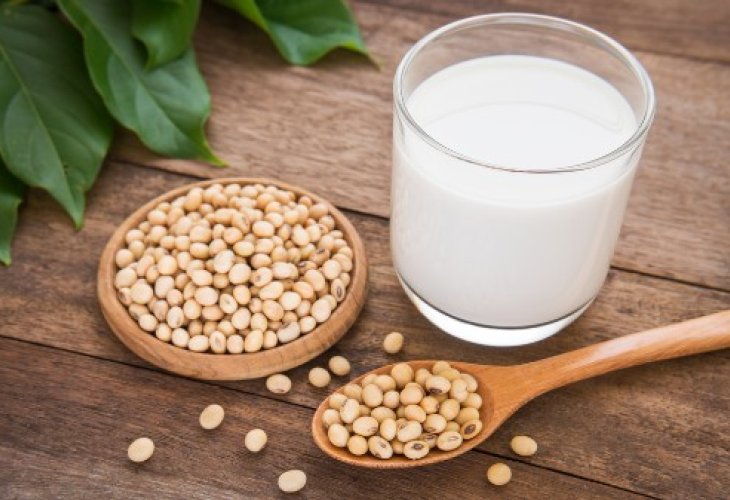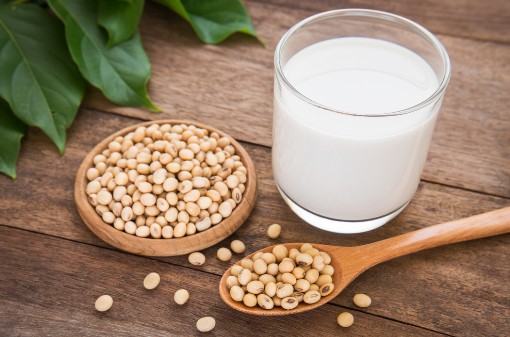Jewish Law
Why Soy Milk Is Kosher Even When Cooked by Non-Jews
A halachic deep dive into the kosher status of soy milk — and why it’s like coffee, not cooked food
- Rabbi Yishai Malka / Yom LaYom
- |Updated

Sometimes a question seems to have no solution — an absolute halachic impasse. Yet with deep Torah knowledge and technical understanding, a door suddenly opens wide, revealing that what appeared forbidden can, in fact, be perfectly permissible. A striking example of this is soy milk.
The Basic Question: Isn’t Cooked Soy Prohibited?
We’re all familiar with soybeans — small, pale-brown legumes that are completely inedible unless thoroughly cooked. So, if we were asked: What is the halachic status of soybeans cooked by a non-Jew? Our instinctive answer would be that it is forbidden due to bishul akum (the rabbinic prohibition against eating food cooked by a non-Jew).
How is it possible then that mehadrin (strictly kosher) certification agencies grant kosher approval to soy milk manufactured abroad, in factories entirely staffed by non-Jews, when the production process includes cooking the beans? Why isn’t soy milk prohibited as bishul akum?
How Soy Milk Is Made
The origins of soy milk are somewhat legendary, but it likely comes from East Asia — perhaps Japan or China, where dairy milk was historically unavailable, and plant-based milks like soy and coconut were common.
The modern production process typically follows one of two methods:
Soaking and cooking: The soybeans are soaked in water until they swell, then ground and cooked.
Simultaneous cooking and grinding: In advanced facilities, computer-controlled machines cook the beans as they’re ground.
In both methods, the final result is a thick porridge-like liquid, which is diluted with water and strained through filters, producing a smooth, white drink that we know as soy milk.
Its composition is roughly:
92.5% water
3.4% protein
1.5% carbohydrates, plus trace vitamins (mainly B-complex).
Why It’s Not Bishul Akum
When analyzing this process, we find that water is the overwhelming majority — the soy component merely adds flavor, texture, and color. This is similar to coffee, where water is the main ingredient and the coffee granules only flavor it.
When this issue was brought before Rabbi Moshe Yosef head of the Beit Yosef Badatz, he ruled that soy milk is not subject to bishul akum, for the same reason that coffee and beer are not.
Here’s why:
Not a main dish: Some authorities say bishul akum applies only to foods served as part of a main meal, not to beverages or condiments. (Although Maran Rabbi Ovadia Yosef proved that even desserts or “side foods” can fall under bishul akum, he still permitted coffee for a different reason.)
Water is the primary ingredient:
Coffee, and by extension beer, are mostly water. The brewing process doesn’t make the water itself “cooked by a non-Jew” in a halachically meaningful sense. We bless “Shehakol nihye bidvaro” on beer — indicating the water is the essential element. Similarly, since over 90% of soy milk is water, the drink is treated like coffee or beer — and therefore permissible.

Additional Reason for Leniency
Rabbi Yosef added another layer of logic: even after the soybeans are boiled, the resulting liquid is not yet drinkable — it tastes bitter and unpleasant. Only after adding flavorings and sweeteners does it become palatable. Thus, the cooking stage performed by non-Jews does not produce a “ready-to-eat” food; it merely extracts the protein. Since the cooking doesn’t create an edible product, the prohibition of bishul akum doesn’t apply.
The Arizal’s Custom
It’s noted that the Arizal refrained from drinking coffee because the beans were roasted by non-Jews — a concern that only applies to roasted foods. Soybeans used for soy milk are boiled, not roasted, and even if they were, there is no custom of inviting guests “for roasted beans,” and so the prohibition wouldn’t apply.
Ancient Method: Soy Milk Without Cooking
Interestingly, traditional soy milk didn’t even require heat. In earlier times, it was made simply by:
Soaking soybeans in water for several hours until the protein naturally separated.
Grinding the soaked beans with water.
Straining the mixture through cloth.
Repeating the process with added water until a milky liquid was produced.
Thus, the boiling step in modern factories is merely a time-saving shortcut, not an essential part of the process.
Soy milk produced in non-Jewish factories can receive kosher certification — provided other ingredients and production lines meet kashrut standards.

